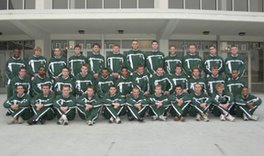Title IX complaint filed over OU athletics cuts
By Jim Phillips
Athens NEWS Senior Writer
Thursday, April 5th, 2007
The Office for Civil Rights of the U.S. Department of Education is looking into a complaint filed with the agency against Ohio University.
The complaint alleges that OU's recent decision to drop men's swimming and diving as varsity sports programs violates Title IX of the Education Amendments of 1972.
Title IX prohibits discrimination on the basis of sex in all educational programs or activities that receive federal financial assistance.
DOE spokesman Jim Bradshaw confirmed Tuesday that someone filed a Title IX complaint with the OCR on March 13. According to Bradshaw, the agency typically takes about a month to evaluate such a complaint, to see if it wants to launch an investigation.
He said an evaluation is done "to see if we have jurisdiction in the case, if it involves allegations for laws that we enforce, such as Title IX, or Title VI of the Civil Rights Act (of 1964)." The OCR keeps the names of complainants confidential, Bradshaw added.
If the agency does decide there's reason to take up the complaint, he said, by way of public announcement "we would simply state that the case is under investigation." Bradshaw said an investigation of such a complaint typically takes about six months to finish.
According to the OCR's Web site, a discrimination complaint must be filed within 180 days of an allegedly discriminatory act.
Reasons the agency would choose not to accept a complaint for investigation might include the fact that it already has been investigated by another agency, whose determination meets OCR's standards; that it was filed too late; that the allegations raised by the complaint have been resolved; or that the complainant refuses to share information necessary to investigate the complaint.
The OCR also offers early complaint resolution, giving the parties a chance to work out their dispute before an investigation starts.
If this doesn't work, OCR will investigate by reviewing documentary evidence submitted by both parties and conducting interviews. After investigating, it make a determination on whether there is, or is not, sufficient evidence to support a conclusion of non-compliance with federal law.
If the OCR concludes there is evidence for non-compliance, and the offending institution is not willing to fix the problem, the agency will issue a letter of findings, and try once more to get the institution to agree to correct the violation. If the offender still doesn't cooperate, OCR can refer the case to the U.S. Department of Justice, or initiate administrative enforcement proceedings to cut off federal financial aid to the institution.
OU Legal Affairs Director John Burns said Wednesday the university had not yet been contacted by the OCR about the complaint.
Thursday, April 5, 2007
Subscribe to:
Post Comments (Atom)




















No comments:
Post a Comment